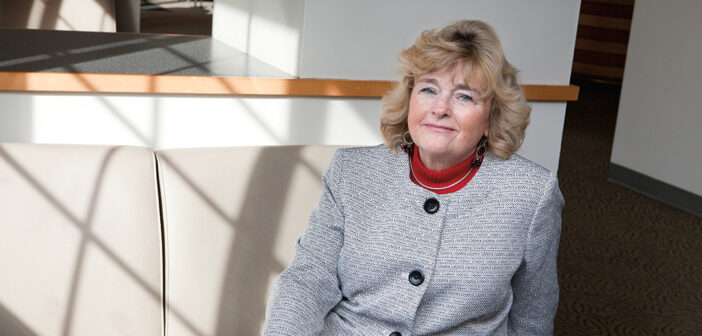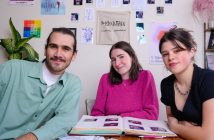You know you’ve made it when a famous actress portrays you on stage. Margaret J. “Peggy” Bia, M.D. (TMC ’68), is a professor of medicine at Yale University, where she co-founded the clinical skills program and won so many teaching awards she’s lost track of the number. Six years ago, at the Long Wharf Theatre in New Haven, Connecticut, she watched herself rendered by Anna Deavere Smith in Let Me Down Easy, a highly acclaimed one-woman show, based on Yale doctors and others, about the American healthcare system—and the strength and fragility of the human body.
Deavere Smith, known for her roles on TV’s The West Wing and Nurse Jackie, transformed into a short, fast-talking, Brooklyn-accented, brilliant, and compassionate physician. That’s Dr. Peggy Bia, who says the actress exaggerated the Brooklyn accent.
Despite Bia’s quibbles, the question Deavere Smith said drove her show—“How do we pursue grace and kindness in a competitive and sometimes distressing world?”—mirrors Bia’s own mission as a medical educator and caregiver.
Long before she was spearheading a new way to teach Yale medical students and long before she was one of few women entering medical school, Bia was paving a path for undergraduate women at Fordham. She was a member of the first class of the all-female Thomas More College, which opened its doors at Fordham 50 years ago this fall.
Bia credits her liberal education—science courses in addition to theology and philosophy—and Fordham’s commitment to community service for molding her into the kind of doctor she has become.
“She’s a dynamo,” says Nancy Angoff, M.D., associate dean of student affairs at Yale Medical School. “She’s tough and gets things done, but it comes from a place of compassion and caring. That’s really what permeated her program in the teaching of clinical skills. This love of being a doctor was so picked up by the students.”
Bia grew up in Brooklyn, the middle child of seven siblings. Her father died when she was 11. Her mother took in foster children to make ends meet. She also took in cousins when they needed a place to stay. “There were always tons of babies in my childhood,” Bia recalls.
She went to an all-girls Catholic high school and met her future husband, Frank Bia, M.D. (FCRH ’67), during socials with the all-boys Catholic school he attended. They’ve been together ever since. She started at Thomas More College when he was a sophomore at Fordham.
Frank always knew he wanted to be a doctor, but Peggy hadn’t considered medicine as an option for women initially. Most of her many female relatives became missionaries, teachers, nurses, or nuns. (One of her sisters is a Sister: Elizabeth Johnson C.S.J., distinguished professor of theology at Fordham.) Bia knew those careers weren’t for her. She toyed with becoming a chemist, but, as she puts it, “I didn’t want to spend my days with test tubes.”
Her pre-med adviser at Thomas More, chemistry professor Frederick Dillemuth, S.J., encouraged her to go to medical school. At the time, she had little confidence in her abilities, but Father Dillemuth and Frank insisted she could handle the work. After she graduated from Fordham summa cum laude in 1968, Peggy and Frank were married at the University Church, with Father Dillemuth presiding. They went to Weill Cornell Medical School and did their residencies at the University of Pennsylvania before earning fellowships to Yale, where they joined the faculty in 1978. They now have two grown sons, each in graduate school.
Bia says she chose to specialize in nephrology because during her residency “the best and most fabulous teachers were nephrologists.” Besides mastering complex renal physiology and caring for kidney transplant patients, she has been a caregiver for her medical students.
She worried at one time that they were not getting the clinical skills to be good, caring doctors. So 15 years ago, she developed a program that emphasizes mentoring. First-year medical students are connected with a physician to help them practice taking medical histories and performing physical exams on patients. They also attend weekly sessions where these skills are practiced in a safe setting.
“There is so much unhappiness in medicine in this day and age,” Bia says. “Finding the joy in practice is a lot harder now than it was years ago. I wanted my medical students to find that joy.”
Despite the complexities of today’s healthcare system, Bia wants to ensure that her students become keen diagnosticians and expert caregivers who form bonds with their patients, listening carefully to their stories. She believes the altruism woven into the Fordham curriculum helped to shape her view of medical practice.
Around Yale, students perceive Bia as tough yet tender—and not without a healthy sense of humor. Indeed, besides being mimicked at the Long Wharf, she’s been lovingly impersonated by her students. Last spring, at a reception for her when she stepped down from leading the clinical skills program, four students donned big blond wigs and took to the podium, each one claiming to be the real “Doctah Bia.”
Although Bia no longer runs the program she founded, she’s still a full-time faculty member in the renal section, lecturing and running workshops on kidney function for medical students, nursing students, and fellows.
“I grew up with this very Catholic spirit that fostered community service,” she says. “I was teaching younger kids since I was in eighth grade, and a group of us taught math and science to underprivileged high school students when I was at Fordham, so that whole aspect of service was really, really emphasized, and I savored it. It definitely informed what I felt I wanted to do with my life.”
Bia may have grimaced at Anna Deavere Smith’s rendition of her, but perhaps the audience grasped what being Dr. Bia really means. Which is also how Deavere Smith once described the central point of her entire show: to pursue and “find grace in the face of a complex world.”
Or, as Frank Bia once put it to a graduating class of medical students, the message Peggy Bia has been transmitting for years is this: The key to a happy, fulfilling career is “listening to and with one’s heart and using one’s hands to both diagnose and touch another person’s life.”
Maybe that’s why everyone wants to imitate Peggy Bia, on and off the stage.
—Randi Hutter Epstein, M.D., is one of Peggy Bia’s former students at Yale. She’s a freelance medical journalist and the author of Get Me Out: A History of Childbirth from the Garden of Eden to the Sperm Bank (Norton, 2010).



